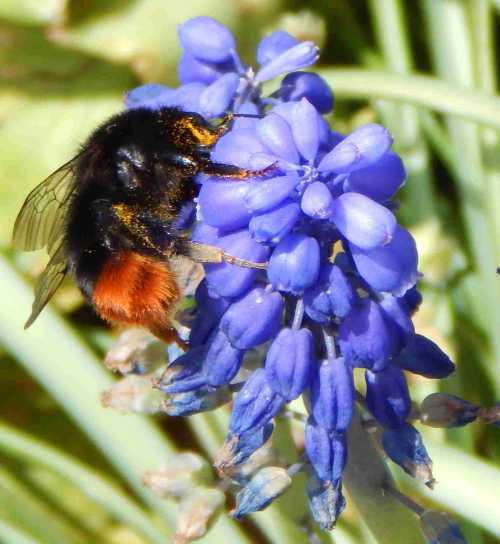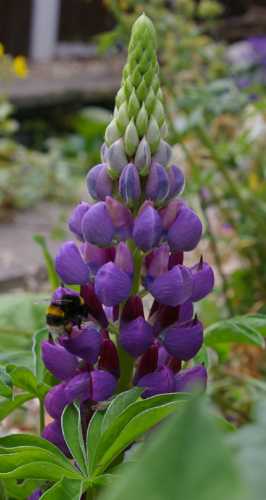Do Bees Like Aquilegias?
Aquilegia (also commonly known as 'Columbine' or 'Granny's Bonnet') are herbaceous perennials. They are very easy to grow and are popular in cottage gardens and wild gardens, but do bees like Aquilegias?
From my observations, they do!
Aquilegias And Bees
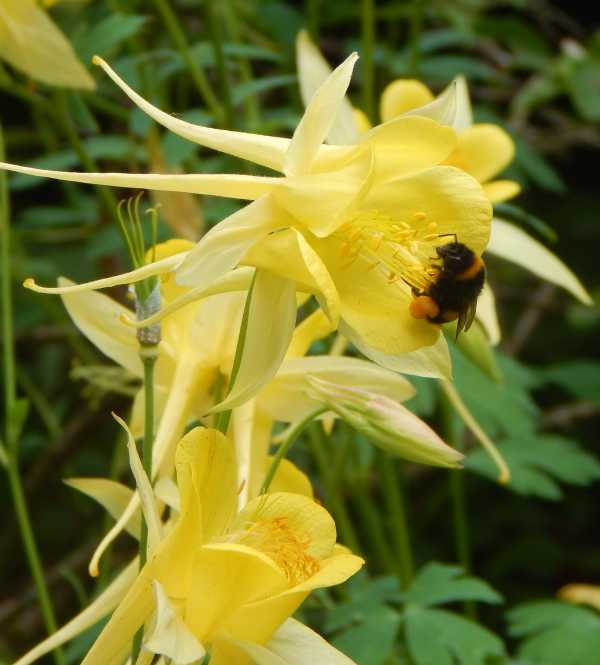 Bumble bee foraging on Aquilegia chrysantha 'Yellow Queen'
Bumble bee foraging on Aquilegia chrysantha 'Yellow Queen'I took the above photograph of a bumble bee foraging on Aquilegia chrysantha 'Yellow Queen' in a public garden.
I have never needed to plant Aquilegias in my garden, but the native columbine, Aquilegia vugaris, sprouts up every year in shades of pink, blue and a deep pinkish-crimson.
I allow them to flourish to give the bees a chance to feed on them in Spring.
After the plants have developed their seed heads, I pull them out (sometimes shaking the seed heads over selected areas of the garden), knowing full well there will be more plants next year. I have never been disappointed.
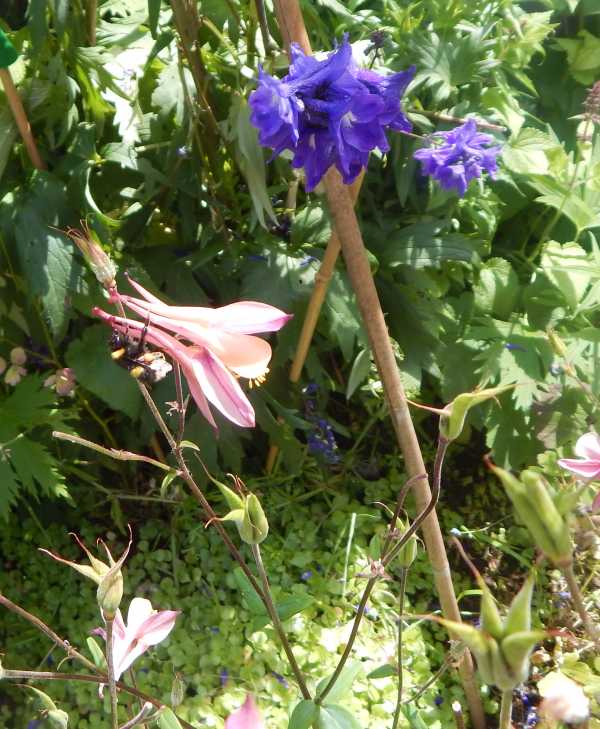 A bumble bee visiting the pink and blue Aquilegia vulgaris in my garden.
A bumble bee visiting the pink and blue Aquilegia vulgaris in my garden.Aquilegias are very easy to grow in sun or light shade, and will tolerate most soils.
Which Bees Like Aquilegias?
In my experience, bumble bees are the most common visitors to Aquilegias.
Honey bees and various solitary bee species will also visit, I believe primarily for pollen, which they gather from the anthers at the ends of the long dangly, stamens.
However, nectar may not be so easy to collect from these flowers .....
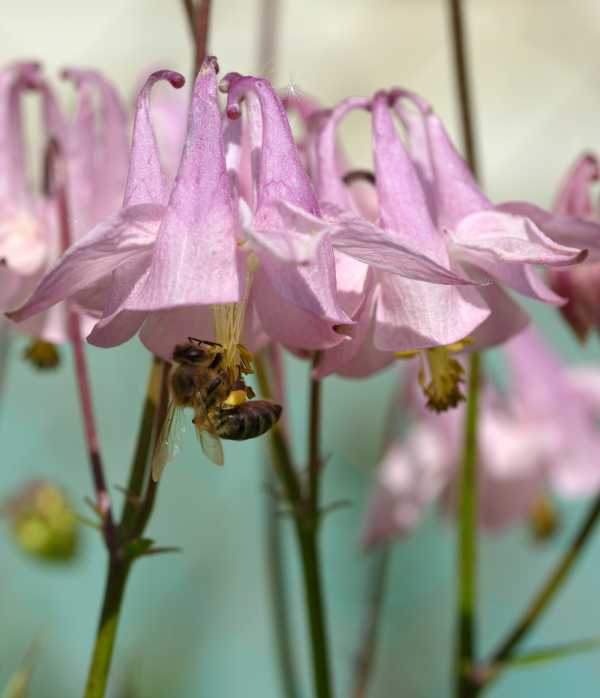 A honey bee gathers pollen from the anthers of an Aquilegia flower.
A honey bee gathers pollen from the anthers of an Aquilegia flower.Aquilegias are a target for nectar robbing!
On a number of occasions I have watched bumble bees nectar robbing Aquilegia flowers.
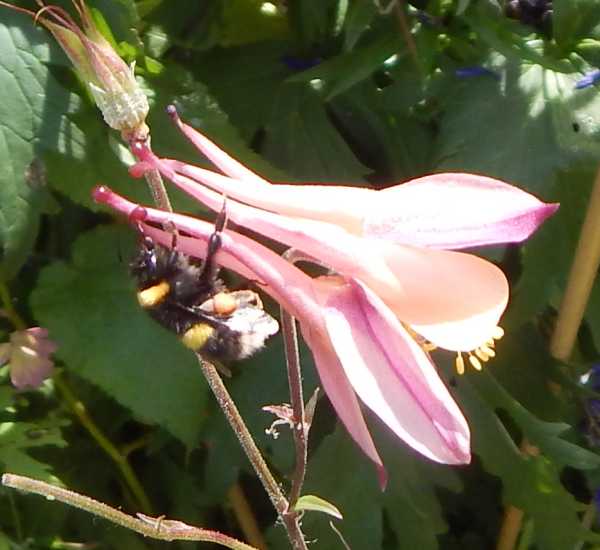 Bumble bee nectar robbing pink Aquilegia flower growing in my garden.
Bumble bee nectar robbing pink Aquilegia flower growing in my garden.Gathering pollen from the ends of the exposed, dangly stamens would be straight forward for bumble bees, and it's not unusual to see bumble bees foraging on Aquilegia with full pollen baskets.
However, gaining access to the nectaries deep within the flower would be difficult, especially for species with shorter tongues.
In such cases it's easier for the bee to pierce the base of the flower with a small hole so that they can get at the nectar.
Are Aquilegias native?
- Aquilegia vulgaris plants are native to the UK and Europe.
- This list is not exhaustive, but North American columbines include:
Aquilegia coerulea,
Aquilegia triternata,
Aquilegia schockleyi,
Aquilegia grahamii,
Aquilegia eximia,
Aquilegia elegantula,
Aquilegia desertorum,
Aquilegia formosa,
Aquilegia canadensis,
Aquilegia barnebyi,
Aquilegia chaplinei,
Aquilegia chrysantha,
Aquilegia flavescens,
Aquilegia micrantha, and
Aquilegia pubescens.
If you are specifically seeking a native columbine to grow in your garden, check with a local plant conservation organisation for advice.
Which Aquilegia are best for bees?
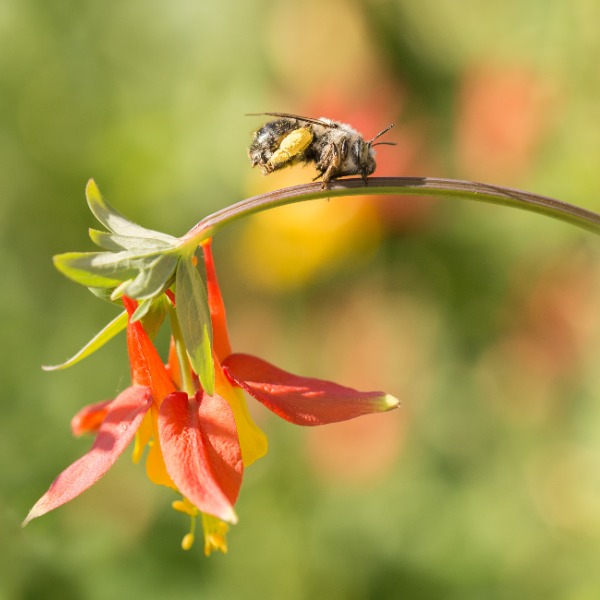 A bee sleeping on a the stem of an Aquilegia flower - Aquilegia canadensis (Canadian Columbine). Yes, some solitary bee species really do sleep in this position!
A bee sleeping on a the stem of an Aquilegia flower - Aquilegia canadensis (Canadian Columbine). Yes, some solitary bee species really do sleep in this position!If you already have native columbines growing in your garden, they may be well suited to the local pollinator population, including bees.
Otherwise, many bee-friendly varieties are available - check with your supplier for details.
Some of my personal favourites include:
- Aquilegia canadensis (Canadian Columbine) - a lovely red columbine;
- Aquilegia chrysantha 'Yellow Queen';
- Aquilegia desertorum (deadhead regularly to see flowers all summer);
- Aquilegia 'Alaska' (beautiful white columbine with many flowers);
- Aquilegia Songbird 'Bunting' (very pretty, soft, sky-blue petals);
- Aquilegia 'Origami Rose and White' (lovely delicate pink and white).
Resources
- Royal Horticultural Society
- United States Department of Agriculture: Aquilegia Express: Columbine Natural History
